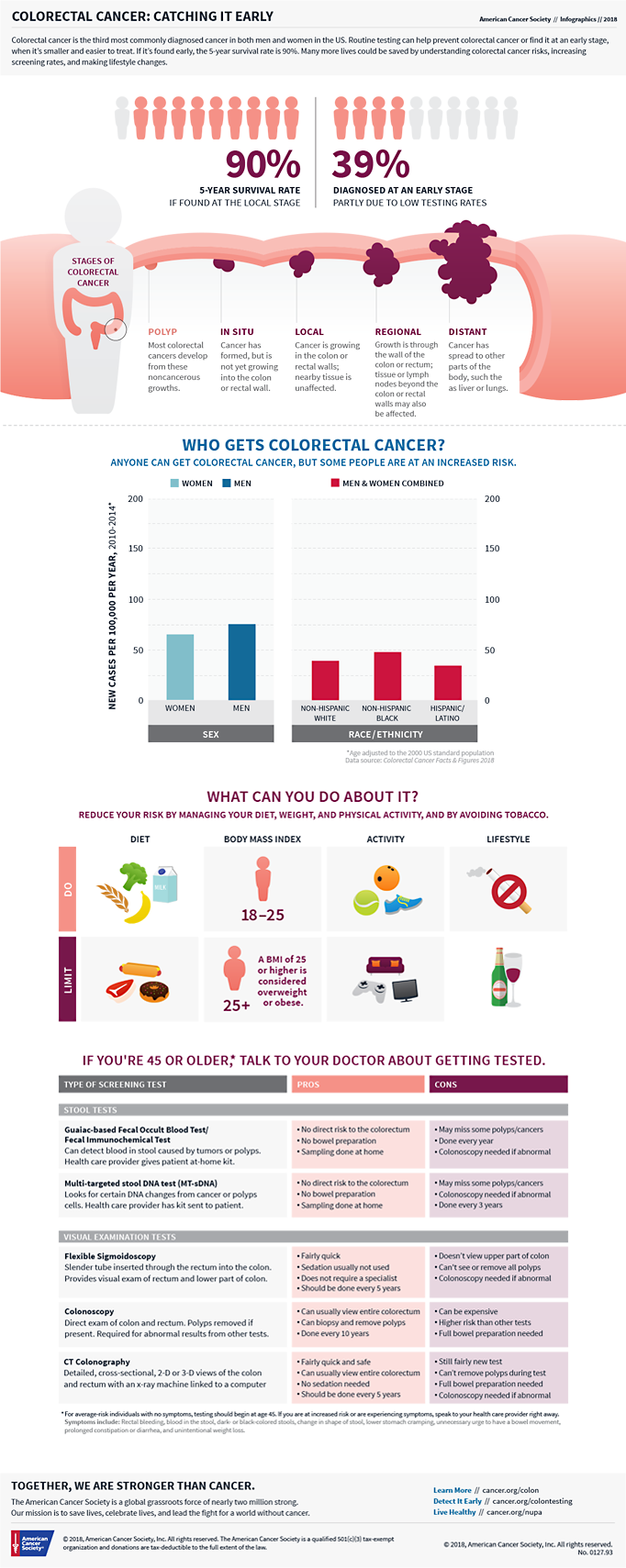
American Cancer Society Drops Ideal Screening Age at 45

According to the recent statistics, more and more people are being diagnosed with colorectal cancer. However, not everyone is actually as aware or know enough about it. This type of cancer actually started from the colon.
If it begins with the colon then it would be referred to as colon cancer but if it begins with the rectal area then it would be referred to as rectal cancer. Cancer is known to start once the cell from the certain area in the body starts to get out of control and would then affect all the other cells not just around it but to other parts as well.
According to the newest study that was published in the Journal of the National Cancer Institute last year, more people are getting colorectal cancer and they are actually getting younger and younger, which now led to the American Cancer Society says that people at the age of as early as 45 must get screened for it.
Updated guideline for #colorectalcancer: If you’re age 45 or older, you should start getting screened. There are a number of test options available, so no matter what you choose, the most important thing is to #GetScreened. https://t.co/lgOIKR6Ib3 pic.twitter.com/S8QofvZ2mE
— American Cancer Society (@AmericanCancer) May 30, 2018
Millennials at Huge Risk
It was discovered that from the 1980s up to 2013, the rates of people having colon cancer has increased at the age of 30 and up. The 1-2 percent increase may not be that alarming but the statistics on adults who are older than 30 didn’t rise that much over the years. Rectal cancer rates have also increased, which is why experts are convinced that people under the age of 50 who were diagnosed with colorectal cancer have now doubled.
According to Rebecca Siegel of the American Cancer Society, her team has noticed the increase in the number of people who belong to the millennial generation, when it comes to being diagnosed with colorectal cancer. However, they didn’t exactly expect that the increase would be this big. Their research didn’t exactly specify as to why and how younger people are getting it, but Siegel mentioned that one of the most possible reason may be the lifestyle change of the young adults today. People under the age of 45 are getting less sleep, consuming less and less fiber and of course eating more unhealthy and processed foods.
Get Screened Earlier For Colorectal Cancer, Urges American Cancer Society https://t.co/qYz0Y3BrdV
— NPR (@NPR) May 30, 2018
The statistics also showed how people who were born in the 1990s are the ones who are at risk since their numbers continue to grow, this is all compared to the people who were born in the previous years. One of them is them is the 34-year-old runner Jessica Dilts, who was diagnosed with rectal cancer. At first, she was simply diagnosed with hemorrhoids and an intestinal disorder when she found blood on her stool. However, her symptoms got worse after a heat and when she had a colonoscopy, it was discovered that she has rectal cancer and it has already spread throughout her lungs and liver.
Colorectal cancer involves a part of the large intestine and people are most likely developing these cancer cells starting from the inner wall. According to experts, cancer in the colon or rectum are not exactly related to the papillomavirus just like what they think, this is because the HPV-related anal cancer is associated with the squamous cell cancers, but these cannot be found in colorectal cancer.
Colorectal Cancer Screening At
It is indeed very alarming that more and more people under the age of 45 are being diagnosed with colorectal cancer, this is why the American Cancer Society is now recommending people to undergo the screening at the age of 45 instead of the usual age of 50. Their extensive analysis pushed them to lower their ideal age of screening since this could definitely change and save lives.
This was even backed up by surgical oncology professor George Chang since younger patients have indeed been suffering. When asked if he has an idea as to what exactly contributes to this increase of numbers, he just stated that it is indeed a million dollar question and further studies must be done. However, he believes that obesity, unhealthy diet, and lack of exercise are all contributing to it.

Then again, these changes on the age of screening will be up to the primary care physicians, but the American Cancer Society highly recommend it. The United States Preventive Services Task Force, on the other hand, does not agree with the change in age.
More in Health & Well-Being
-
`
Experts Reveal The Secret to Dealing with and Overcoming Your Anxiety
Most people feel and deal with anxiety at some point in their lives. Maybe they’re bothered about how they perform in...
June 30, 2025 -
`
Here’s Why You Should Never Ask a Celebrity For Parenting Advice
Whenever we see our favorite female celebrities or public figures becoming an expecting or parenting mom, we couldn’t help but squeal...
June 30, 2025 -
`
DIY Skin Care Tips That You Need To Know To Have Healthy Skin
Our skin is one of the most important parts of the body. It is also the largest. It is part of...
June 30, 2025 -
`
These Celebrity Weight Loss Tips Are The Real Deal
We have always wondered how a celebrity can go from undesirably fat to drop dead gorgeously slim just for a movie....
June 30, 2025 -
`
Fewer Cancer Deaths Attributed To Arsenic Reductions In Drinking Water
Arsenic is a natural element found not only in living things like animals and plants but also in water, soil, and air. The said...
June 29, 2025 -
`
THIS Is The Workout Your Brain Needs To Maintain Great Mental Health
The brain is the capital of the human body, the engine room that controls all other activities. As your body grows,...
June 29, 2025 -
`
BREAKFAST and WEIGHT LOSS – Why A Healthy Breakfast Should Be A Part Of Your Weight Loss Plan
People have complained that it is relatively hard to lose weight during particular seasons and relatively easy to lose weight during...
June 29, 2025 -
`
This Is Why You Always Feel Bloated
A bloated stomach is a problem for various people. The feeling is unpleasant and sometimes has a negative impact on one’s...
June 29, 2025 -
`
Rami Malek Received Treatment After a Tragic Accident at the Oscars
There has been hardly an award event where we don’t witness at least one embarrassing slip-and-fall accident, but it’s usually the female celebrities...
June 29, 2025















You must be logged in to post a comment Login